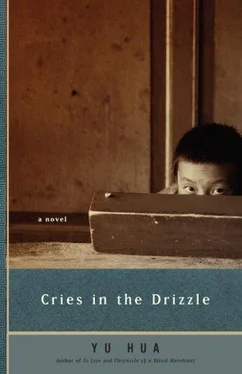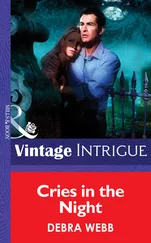The households with Buddhist leanings were shocked by my grandfather's audacious proposal. My father was amused, at least at first. After days of being down in the dumps Sun Kwangtsai gave us a smile, and pointing at my grandfather as he staggered around in the rain he said to us, “The old man can still tough it out.”
Only when several old folks hurried over in alarm and begged Sun Kwangtsai to put a stop to Sun Youyuan's impious canvassing did he realize that it was all getting out of hand. I couldn't help but feel anxious for Granddad.
Sun Kwangtsai went up to his father and yelled at him savagely, “Get back home!”
To my astonishment Granddad showed no signs of his usual fear. His stiff figure swiveled ponderously in the rain, and he took a long hard look at Sun Kwangtsai. Then he raised his finger and pointed at him. “You go home,” he said.
My father was outraged at my grandfather's temerity. “You stupid old fart, you're tired of living, aren't you?” he cursed.
But Sun Youyuan repeated slowly, with emphasis on every word, “You go home.”
My father was flummoxed. Standing there in the rain, he glanced around helplessly, and there was a pause before he finally said, “Shit, he's not scared of me anymore.”
The village production team leader, as a member of the Communist Party, felt that worship of the bodhisattva had gone on quite long enough; he had a responsibility to curb this superstitious practice. With three militiamen in tow, loudly touting the principle of man's capacity to triumph over nature, he went from door to door in a hunt for effigies. He used his incontestable authority to intimidate the weak-kneed villagers, warning them that anybody who tried to harbor a bodhisattva would be punished as a counterrevolutionary.
So that morning there was an uncanny convergence between the Communist Party's methods of dispelling superstition and my grandfather's approach of seeking divine intervention by punishing the bodhisattva. I must have seen at least a dozen clay bodhisattvas tossed out into the rain. My grandfather reprised his role of the previous afternoon, clutching his shabby umbrella and stumbling around from door to door, circulating his latest bulletin. Now that his teeth had all fallen out, his words undulated incoherently in the rain, as with a reassuring smile he told people, “The bodhisattva can't take more than a day of soaking. When he's had enough, he'll ask the Dragon King to stop the rain. Tomorrow will be dry.”
My grandfather's confident forecast did not become a reality. The following morning Sun Youyuan stood underneath the eaves watching the billowing rain, his wrinkled face crumpled up with grief. I saw him stand there for a long time, and then, quivering, he turned his head upward, and for the first time I heard him bellow. It had never occurred to me that Granddad could express himself with such violent rage: Sun Kwangtsai's erstwhile tantrums were mere trifles compared to what Sun Youyuan came out with then. My grandfather turned to the sky and yelled, “God, you bastard! Why don't you get your cock out and fuck me, if that's what you want?”
But then all of a sudden my grandfather looked lost. His mouth seemed to be frozen open, as if he were dead. His whole body tightened and he stood rigidly for several moments. Then he went limp and burst out wailing.
What was curious was that at midday the rain stopped. The old folks were awestruck. As they watched chinks gradually appear in the clouds and the sun shine down at last, they could not help but recall the crazy behavior of Sun Youyuan earlier, which they had then regarded as sacrilege. These credulous villagers began to feel with wonder and trepidation that Sun Youyuan possessed the bearing of an immortal, and his ragged clothes made them think of the legendary mendicant priest Master Ji. In fact, of course, had the Communist Party member and team leader not commandeered the militiamen and conducted the search, the villagers would never have thrown their bodhisattvas out in the rain. But at the time nobody was in the mood to give the production team leader any credit, and the notion that Sun Youyuan might be an immortal spread like wildfire through the village for the next three days. Eventually even my mother wondered if there was some truth to it. But when she cautiously sounded my father out on this question, Sun Kwangtsai said, “What a load of crap.”
My father was a confirmed materialist. He said to my mother, “It's his sperm that made me. If he's an immortal, then I've got to be one too, no?”
FADING FROM VIEW
Just before he died Sun Youyuan wore an expression very much like that of a water buffalo as it waited to be slaughtered. Though such an imposing animal in my eyes, the buffalo lay on the ground with legs splayed, meekly allowing itself to be trussed. I was standing off to one side of the village drying ground and my brothers were standing right at the front. The commentary of my little brother, who pretended to understand more than he actually did, drifted like dust through the morning air, interspersed with Sun Guangping's scoffing, “You don't know shit!”
At first I was no smarter than my little brother, believing that the water buffalo didn't know what was going to happen to it. But then I saw its tears, the tears it shed after being trussed up; they sprayed the concrete floor like raindrops in a thunderstorm, for when facing extinction life reveals its infinite attachment to the past. It was not just grief that I saw in the buffalo's expression but also a kind of despair, and there is no more shocking sight than that. Later I heard my big brother tell other boys that the buffalo's eyes reddened as soon as it was tied up. In the years that followed I would recall with a shudder the scene just before the buffalo's death: the tattered images of its polite surrender and its unresisting submission reappeared before my eyes, leaving me troubled and uneasy.
For a long time Granddad's passing was an enigma to me, its raw reality imbued with a mysterious ambience that made it impossible for me to ascertain the true cause of his death. “Joy at its fullest gives way to sorrow,” they say, and no sooner had my grandfather delivered his fearless challenge to the heavens on that rain-swept morning than he was cast back into an abyss of misgivings, dumbstruck and lost. At the moment when he opened his mouth to yell, he felt to his astonishment that there was something inside him desperate to find an outlet, something that took wing with sublime, birdlike ease. He wheeled around in alarm, crying pitifully, “My soul! My soul has flown away.”
Like a little bird, his soul had flown out through his gaping mouth. To me at thirteen this was something startling and bizarre.
That afternoon I saw on Granddad's face the look that I had seen on the water buffalo. By then the sky had cleared and the senior population in the village was marveling that Sun Youyuan's prediction had been fulfilled. My grandfather was in no position to enjoy his hour of glory, so grief stricken was he at the loss of his soul. Sun Youyuan sat tearfully on the doorsill, the returning sunshine in his face, and mournful whimpers came from his gaping mouth. He started crying after my parents went off to the fields and his tears were still gushing when they returned. I have never seen anyone cry for so long.
When Sun Kwangtsai came back home at the end of the day and saw his father's tears, he preferred to think they were being shed out of concern for himself. “I'm not dead yet,” he muttered. “A bit early to mourn, isn't it?”
Later my grandfather rose from the doorsill and brushed past us, sobbing. He did not join us for dinner as usual but went into the cluttered storeroom and lay down in his bed. Soon afterward, however, in a voice of unusual force, Sun Youyuan called his son, “Sun Kwangtsai!”
Читать дальше












